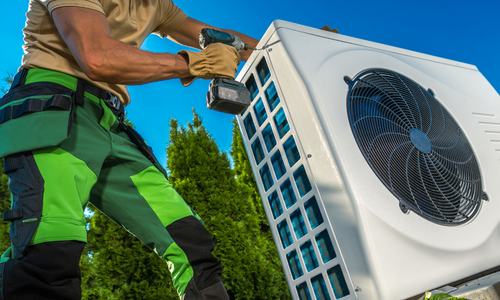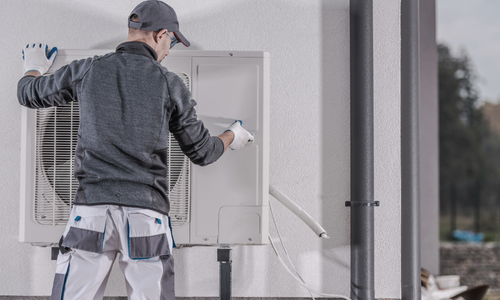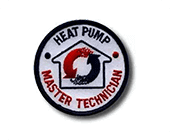If you’re wondering how to stay warm during the winter without breaking the bank, you might be interested in learning how a heat pump works in the winter. Heat pumps have been gaining popularity in recent years as a more energy-efficient and eco-friendly alternative to traditional heating systems.
However, some people still question their ability to effectively heat a building during the winter months.
In this article, we will explore how heat pumps work during the winter and address some common concerns about their performance.
How do heat pumps work?
Unlike conventional heating and cooling systems, heat pumps may be used for both heating and cooling. One of the key things to understand about heat pumps is that they work by transferring heat from one place to another, rather than generating it directly.
This means that they are highly dependent on the temperature of their source of heat. In the winter, the air or ground outside the building may be very cold, making it more challenging for a heat pump to extract heat. So this may naturally make you ask, “How does a heat pump work in the winter?”
To overcome the challenge, heat pumps are designed with a variety of features that enable them to continue providing heating even in very cold temperatures. For example, many heat pumps use a defrost cycle, which periodically melts any ice that may have formed on the outdoor unit.
This helps to ensure that the heat pump continues to work effectively even when the outdoor temperature is very low.
How do heat pumps switch from heating to cooling and vice versa?
The reversing valve is an integral part of heat pumps, allowing them to easily change their function from heating to cooling. Based on the temperature setting of the thermostat, this valve will redirect the flow of refrigerant in your unit.
A reversing valve is a component of a heat pump system that allows the heat pump to switch between heating and cooling modes. In heating mode, the reversing valve directs the refrigerant to flow in one direction, drawing heat from the outside air or ground and transferring it inside the building. In cooling mode, the reversing valve directs the refrigerant to flow in the opposite direction, allowing the heat pump to extract heat from inside the building and release it outside.
To ensure that the reversing valve operates correctly, it is important to have the heat pump system regularly maintained by a qualified technician. A malfunctioning reversing valve can cause the heat pump to operate inefficiently or even stop working altogether.
Regular maintenance and inspection can help to prevent this, ensuring that the heat pump continues to provide reliable and efficient heating and cooling for many years.
How does a Heat Pump work in winter?
One of the benefits of using a heat pump to heat your home is that it can also cool your home in the summer, but you might be asking, how does a heat pump work in the winter specifically? Consider the following points in relation to the heat pumps’ performance during the winter months.
Insulation
One factor in the performance of heat pumps during the winter is the insulation of the building. A well-insulated building will retain heat more effectively, meaning that the heat pump doesn’t have to work as hard to maintain a comfortable temperature.
On the other hand, a poorly insulated building will allow heat to escape more easily, making it more difficult for the heat pump to provide adequate heating.
Defrost cycle
Many heat pumps use a defrost cycle, which periodically melts any ice that may have formed on the outdoor unit. This helps to ensure that the heat pump continues to work effectively even when the outdoor temperature is very low.
Type of heat pump
It’s also worth noting that different types of heat pumps can have varying levels of performance in the winter months. For example, air-source heat pumps are often less efficient in very cold temperatures, as the air temperature drops. However, they are still capable of providing heating in the winter, especially when the outdoor temperature is above freezing.
Ground-source heat pumps, on the other hand, are often more efficient in the winter as they use the stable temperature of the ground as their source of heat.
How does a ground source heat pump work in winter?
The ground temperature is relatively constant below the frost line all through the year, making it ideal for use with a geothermal heat pump or a ground-source heat pump. This implies that your geothermal heat pump will continue to function correctly and gather heat even if the outside air temperature declines.
They are also less affected by changes in the outdoor temperature, making them a more reliable choice for winter heating.
Size of the heat pump
Another consideration is the size of the heat pump. A heat pump that is too small for the building it is heating may struggle to provide adequate heating in the winter, as it may not be able to transfer enough heat to maintain a comfortable temperature.
On the other hand, a heat pump that is too large for the building may be less efficient, as it may not be able to operate at its most efficient setting.
How does a pool heat pump work in winter?
It’s worth mentioning pool heat pumps, which can be used to heat a pool during the winter months. Pool heat pumps work in much the same way as other types of heat pumps, but they are specifically designed to heat water rather than air.
They are a highly efficient and cost-effective way to heat a pool, especially in the winter when the pool water is likely to be colder.
How to ensure the health of my heat pump?
Like any mechanical system, heat pumps require regular maintenance and repair to ensure they operate at peak performance and efficiency. In the following sections, we will discuss the importance of proper maintenance and repair of heat pumps and the steps you can take to ensure your heat pump continues to provide reliable and efficient heating and cooling.
Regular Maintenance
Heat pumps require regular maintenance to ensure they continue to operate at peak performance. This maintenance should be performed by a qualified technician, such as those at Autumn Air, who can inspect the heat pump and identify any potential issues.
Regular maintenance tasks include cleaning the heat pump’s air filters, checking the refrigerant levels, and inspecting the electrical components. Additionally, the technician will inspect the heat pump’s outdoor unit for any damage and check for any leaks in the system.
In addition to regular maintenance, it is also important to have your heat pump inspected annually to catch any issues before they become larger problems. This inspection should be performed before the heating and cooling seasons, so any necessary repairs can be made in a timely manner.
Repair
Despite regular maintenance, heat pumps can still experience issues that require repair. Some of the most common heat pump issues include refrigerant leaks, clogged air filters, and electrical problems. If you notice your heat pump is not operating at peak performance or has stopped working altogether, it is important to have it inspected by a qualified technician.
A refrigerant leak is a common issue with heat pumps. If you notice that your heat pump is not blowing cold air in the summer or warm air in the winter, it could be a sign of a refrigerant leak. If this is the case, it is important to have the leak repaired immediately to prevent further damage to the heat pump.
Clogged air filters are another common issue with heat pumps. If your heat pump’s air filters are dirty, it can reduce the heat pump’s efficiency and cause it to work harder to circulate air.
Regularly cleaning the air filters can help prevent this issue, but if you notice that your heat pump is not performing as well as it should, it is important to have it inspected by a qualified technician.
Conclusion
Whether you are looking to heat your home, commercial building, or pool, a heat pump is a great choice for winter heating, especially when combined with other measures to improve energy efficiency. But as discussed before, incorrect installation of your heat pump can result in various problems, therefore, always consult trusted and established specialists such as Autumn Air for all your HVAC needs.
You can call (602) 266-5247 or click here to book your appointment.















